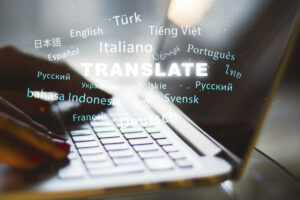Artificial intelligence (AI) is transforming many sectors, and the legal field is no exception to this revolution. With the rise of machine translation tools, lawyers now have access to solutions that enable them to manage multilingual documents faster and more efficiently. However, AI and legal translation raises some key questions: are translations produced by AI accurate enough for the law? What guarantees are there in terms of data confidentiality? How can we distinguish between generalist tools and specialized solutions like Lexa?
In this article, we explore the key issues in AI and legal translation, highlighting the advantages and limitations of existing solutions, as well as Legal 230's unique approach with Lexa.
AI and legal translation: a necessary evolution for lawyers
Law is a field where every word carries legal weight, and where the slightest error in translation can have far-reaching consequences. In the age of globalization, law firms, legal departments and institutions have to juggle with documents written in several languages, ranging from commercial contracts to court rulings, company statutes and internal regulations.
In this context, AI-assisted translation solutions bring major productivity gains. Rather than systematically calling in specialized translators, who are often costly and time-consuming, lawyers can rely on automatic tools to quickly obtain a first translated version of a document. This approach enables them to speed up their work, assess the content of a foreign text and optimize their time management.
However, not all AI is created equal, and legal translation requires a level of expertise that consumer tools cannot always guarantee.
DeepL, Google Translate and the limits of general-purpose tools
Lawyers who have already tested DeepL or Google Translate know that these tools are impressive for everyday texts, but much less reliable when it comes to translating technical or legal documents.
Why aren't DeepL and Google Translate suitable for legal translations?
- Lack of legal context
These tools are based on generalist databases and do not take into account the legal subtleties of a text. For example, a contractual clause translated word for word can lose all its legal value if it is not adapted to the specific usages and wording of each country. - Terminology errors
In legal translation, a false friend can be fatal. For example, the English word liability may be translated as "responsabilité" in business law, but as "obligation" in another context. A tool like DeepL can provide an approximate translation, without distinguishing between different branches of law. - Lack of data confidentiality
Most free tools use the texts sent to improve their algorithms. But when a lawyer translates a confidential contract or pleading, he can't afford to have this data stored on foreign servers, unchecked.
Lexa: a specialized AI for legal translation, designed for lawyers
Faced with these challenges, Legal 230 has developed Lexa, a translation solution dedicated exclusively to legal professionals. Unlike general-purpose tools, Lexa has been trained on thousands of official legal documents, and incorporates precise terminology bases specific to each branch of law.
Why choose Lexa for your legal translations?
- Unrivalled accuracy thanks to official legal databases
Lexa doesn't just translate: it understands the legal context of the text. The tool relies on specialized corpuses (case law, codes, regulations) and professional lexicons adapted to each field of law. - Total respect for confidentiality
Unlike open-source solutions, Lexa guarantees that translated documents are neither stored nor used to train the algorithm. This enables lawyers to work in complete security, in compliance with data protection standards. - Optimized management of legal documents
Lexa enables you to translate entire contracts, while preserving their original layout. No need to reformat a document after translation: everything is ready to use. - Intelligent translation, with optional human review
To ensure the highest level of quality, Lexa offers the option of having the translation proofread by a Legal 230 expert translator, guaranteeing full compliance with legal standards.
Future challenges: what place for AI in legal translation?
While AI can now produce legal translations in a matter of seconds, it will never replace human expertise. The future lies in a balance between artificial intelligence and specialized translators.
Law firms and legal departments will need to integrate these new solutions into their workflows, while taking care to :
- Secure sensitive data by choosing tools that comply with current regulations.
- Check and adapt machine translations to avoid misinterpretations.
- Train their teams in the use of specialized AI to optimize processes without compromising legal quality.
AI, an asset for lawyers, provided they choose the right solution
Artificial intelligence won't replace expert translators, but it is an invaluable tool for lawyers faced with the need to work with documents in several languages. General-purpose solutions such as DeepL are useful for basic translations, but they quickly show their limitations in a legal context.
With Lexa, Legal 230 offers a specialized, secure alternative designed to meet the requirements of legal professionals. Thanks to its sector-specific expertise, strict respect for confidentiality and integration of legal terminologies, Lexa is the benchmark for AI-assisted legal translation.
If you would like to test Lexa and find out how it can transform your legal practice, please visit https://lexamt.com.




